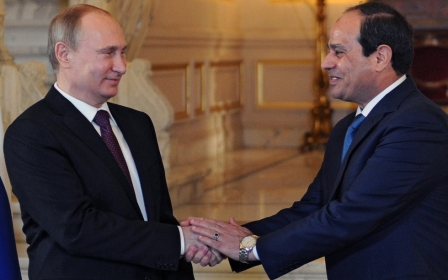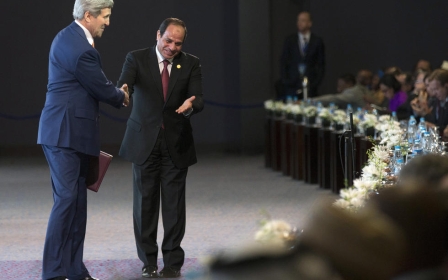British and Egyptian officials discuss Sisi's visit to the UK

British and Egyptian officials have discussed the anticipated visit of Egyptian President Abdel Fatah al-Sisi following British Prime Minister David Cameron's invitation in June.
In a meeting between Egyptian Minister of Foreign Affairs Sameh Shoukry and his British counterpart Philip Hammond in London on Wednesday, they discussed means of countering extremism and developments in Syria, Libya, Iraq and Yemen.
Hammond reportedly expressed anticipation of Sisi’s visit to the UK, reported the Daily News Egypt, while referring to a statement from the British Foreign & Commonwealth Office confirming Cameron’s invitation to Sisi.
The invitation, which came just a day after Mohamed Morsi's name was added to the ever-growing list of death sentences, was much debated, as the visit was not confirmed by officials before the ministry’s statement.
Downing Street did not respond to inquiries about the visit at the time, while the Guardian reported that the UK Foreign Office said the Sisi visit was still expected to take place before the end of the year, but an exact date had not been set.
Reports had alleged there were security reasons behind the delay of the visit, as senior Egyptian officials could face arrest for crimes against humanity if they take up a UK government invitation to visit London, human rights lawyers told the Guardian on 13 August.
Toby Cadman, a war crimes lawyer, told the Guardian at the time he believed that was “almost certainly one of the reasons Sisi did not come” to Britain.
Cadman said he had reason to believe the Sisi government had been concerned by the arrest in London in June of a Rwandan general, Karenzi Karake, on war crimes charges filed in Spain.
Human rights lawyers could seek arrest warrants from British courts on the basis of universal jurisdiction for mass crimes.
“We are pushing for accountability and pushing for prosecutions in the cases of a number of the individuals … and if they travel to the UK we’ll do our best to make sure they are arrested,” Cadman, who is one of the lawyers pressing for prosecutions for the massacres, told the Guardian.
The statements came ahead of the second anniversary of the massacre of at least 1,000 people, according to Human Rights Watch, outside Cairo’s Rabaa al-Adawiya mosque. The massacre is considered the worst of three mass killings of supporters of ousted president Mohamed Morsi during the summer of 2013.
The Guardian reported in June that Hassiba Hadj Sahraou, Amnesty International’s Middle East and North Africa deputy director, described the invitation as astonishing given the “appalling” human rights violations taking place in Egypt.
“There’s been a sharp rise in the number of death sentences and executions since Sisi came to power, some of which have taken place after grossly unfair trials. Thousands have been detained and many languish in jail, including journalists, in an apparent attempt to quash all dissenting voices,” she said.
Stay informed with MEE's newsletters
Sign up to get the latest alerts, insights and analysis, starting with Turkey Unpacked
Middle East Eye delivers independent and unrivalled coverage and analysis of the Middle East, North Africa and beyond. To learn more about republishing this content and the associated fees, please fill out this form. More about MEE can be found here.




